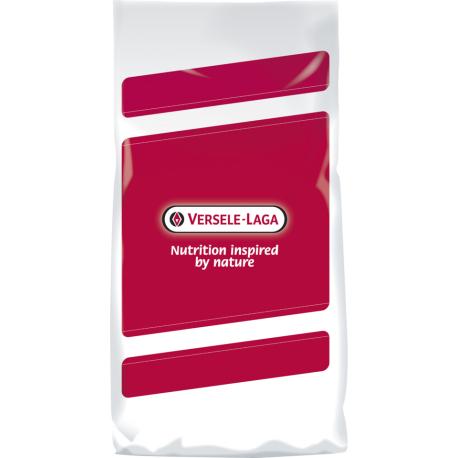





Reference: 498724
The canary seed is a grass, an annual plant up to 1m tall, the seeds being found in the inflorescences. These seeds make up a significant fraction of the majority of bird mixes.
• Excellent for canaries, European and exotic birds, wavy parakeets and large parakeets.
The canary seed is a grass, an annual plant up to 1m tall, the seeds being found in the inflorescences. These seeds make up a significant fraction of the majority of bird mixes.
• Excellent for canaries, European and exotic birds, wavy parakeets and large parakeets.
Estimated value of its composition:
Fat 5%
Carbohydrates 55%
Protides 15%
Vitamins B and E
Canary grass is a nutritious seed particularly appreciated by many birds. Its high protein and fibre content makes it an essential food for the good health and vitality of birds. It is especially ideal for canaries, budgerigars, serins, and other small exotic birds.
Characteristics:
- Ingredients: 100% natural canary grass.
- Appearance: Elongated seeds, from pale yellow to light brown in colour.
- Nutritional Value: Rich in proteins (about 16%), fibres, and essential amino acids.
- Benefits:
- Promotes good digestion thanks to its fibre content.
- Contributes to the shine of plumage.
- Provides the necessary energy for birds' daily activities.
Dari, also known as sorghum or millet, is a variety of grain that is related to millet varieties. Dari is the size of a hemp seed. The grain originates from the warm regions of Australia, Asia, Africa, and South America. There are three varieties: white dari, yellow dari, and reddish-brown dari. It is noteworthy that more value is attributed to light dari than to reddish-brown dari. Regarding nutritional value, there is not the slightest difference. Furthermore, reddish-brown dari is well appreciated by lovebirds. Dari can be compared to wheat in terms of starch content. The seed has a favourable composition of amino acids. The protein present in dari has a particularly high leucine content.
Pine seeds are a good source of Phosphorus, Magnesium, Zinc, Manganese, Copper, Iron, Vitamin E, K, B1, B2, B3, B9.
Basil 1kg
Basil contains many antioxidants, is anti-inflammatory, and helps against stress. This does not mean that basil is considered a medicine. Dried basil is of course also different from fresh basil plants. But the fact remains: basil is good for health.
Clover stimulates the immune system and slows down cellular ageing through its excellent antioxidant properties. Rich in vitamins B, C, E and provitamin A.
Soybeans are an excellent source of iron, zinc, manganese, copper, selenium, potassium, vitamins, fiber, polyunsaturated fatty acids and antioxidants, in short, it is an excellent dietary supplement.
Soybeans are often used in sprouting seed mixes.
Millet is used in the diet of all birds: straight beaks and hooked beaks. In clusters, it's a delicacy they love.
Millet in clusters has a good protein and carbohydrate content and it also contains a large number of amino acids. Ideal to distract your birds and thus avoid pecking (pulling feathers).
We advised to give red millet for exotic birds. It is richer in protein than yellow millet.
These seeds rich in lipids and proteins are especially appreciated by wild birds. They will attract sizerins, reeds, goldfinches, black-headed chickadees, sparrows, sad doves and a host of other birds to your garden. It is often used as a replacement for the more expensive shuttle.
Canary seed is a grass, an annual plant that can reach up to 1m in height, with seeds found in the inflorescences. These seeds make up a significant portion of most bird seed mixes.
• Excellent for canaries, European and exotic birds, budgerigars, and large parakeets.
• EXTRA canary seeds have undergone additional cleaning and are of exceptional quality. Unique on the market!
The sunflower seed contains nearly 40% lipids, but also proteins, carbohydrates, and vitamins B and E. A sunflower seed contains approximately 600 kilocalories per 100 g.
It meets the needs of a wide variety of birds throughout the year, including the smallest among them.
Sunflower seeds are a real treat for our birds who love them!
Striated sunflower is the basic seed of any parrot mixture. It is also used in mixtures for parakeets and exotic doves.
It is also the favorite food of your outdoor birds during the winter period! Ideal for feeding the birds in your garden.
Practical information for giving sunflower seeds to birds in your garden:
Remember to regularly clean the feeders of your outdoor birds so that diseases and bacteria do not thrive.
Also consider setting feeders high up to prevent predators (such as cats, foxes, etc.) from targeting birds when they are eating.
Clover stimulates the immune system and slows down cellular ageing through its excellent antioxidant properties. Rich in vitamins B, C, E and provitamin A.
Peeled sunflower seeds are suitable for your budgies and parrots but also for straight beaks that live in outdoor aviaries in winter.
Sunflower seed contains almost 40% fat, but also proteins, carbohydrates, vitamins B and E. We quantify on a sunflower seed nearly 600 Kcalories per 100 g.
It satisfies throughout the year, the needs of a wide variety of birds, including the smallest of them.
Sunflower seeds are a real treat for our birds who love them!
No waste, no waste! The garden stays clean!
Foniopaddy Seed is a natural grass seed grown on our plantations in Uganda. Scientific research has shown that Foniopaddy has a beneficial effect on coccidiosis.
Foniopaddy Seed is a natural grass seed grown on our plantations in Uganda. Scientific research has shown that Foniopaddy has a beneficial effect on coccidiosis.

The canary seed is a grass, an annual plant up to 1m tall, the seeds being found in the inflorescences. These seeds make up a significant fraction of the majority of bird mixes.
• Excellent for canaries, European and exotic birds, wavy parakeets and large parakeets.
